| This article pertains to Xenogears: the sub-database of Xenosaga Wiki. |
Xenogears deals with many themes and topics.
Despite that the game was given a T for teen rating by the ESRB, the game discusses and deals with a lot of mature and controversial subject matter, such as religion, genocide, sexuality, discrimination, and more.
The game is known for its religious allusions, containing overtones of Gnosticism, Jewish mysticism, Jungian psychology, humanism, and Abrahamic religious symbolism, as well as questions about the nature of existence, humanity, culture, faith and religion.
According to Xenogears Perfect Works, the storyline is intended to ask the player what they would do in each case, as well as the power of 'blood' (connections between people), and fate.
Other interpretations see it also as a story about breaking from fate, and the fight to freely choose one's own path.
| This section contains theories based on the research or speculation of one or several fans. While based on official information, the theories themselves may not be officially verified by developers. |
Major themes[]
Psychology[]
Xenogears delves into philosophical and psychological issues, using and examining terms and ideas from Carl Jung, Friedrich Nietzsche, and Sigmund Freud.
The most obvious allusion involves the nature of the game's protagonist, Fei Fong Wong, whose Freudian ego, superego, and id are discussed at length throughout the course of the game. Fei had subconsciously repressed his memories because of his unpleasant childhood. However, his desire to remember elements of his past eventually leads to his discovering the truth about who he is and what his relationship with the character known as 'Id' is. This repression also relates to the Jungian concept of the shadow.
Distinctly Adlerian in nature, however, are the actions of certain characters, such as Ramsus, whose actions are driven by an inferiority complex that stems from unconscious 'nodes' that often permeate exterior behaviors of an individual.
Although not distinctly psychological, allusions to the theories of the German philosopher Nietzsche are found in game. For example, there is the concept of the eternal return, which, in Xenogears, correlates to the recurrences of the Contact and the Antitype.
God and religion[]
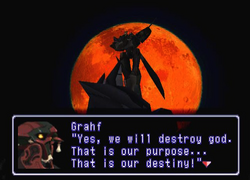
Stand tall and shake the heavens.
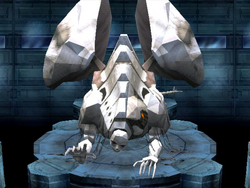
Deus, a man-made amalgam of parts beyond human understanding.
| “ | God? Where does such a being exist? ...Can't you see that such a divine being just never existed from the beginning? And you don't seem to realize this, but you yourself were passing judgement on sinners as much as we were!
|
” |
Like preceding Japanese media such as the Megami Tensei series and concurrent media like Neon Genesis Evangelion, Xenogears incorporated themes and references from various religions, mainly Abrahamic.
The plot of Xenogears involves the main character, Fei, defeating Deus of the "Yabeh interplanetary invasion system", which had seeded humanity on the planet in order to eventually use them as parts for its new body. The protagonist Fei is called the "slayer of God" and the game contains a track called "One Who Bares Fangs at God".
At the same time, due to his potential powers, Fei is equally liable to destroy Deus by eliminating humanity. This is a path Grahf took, in order to free Elehayym and Myyah, the two sides of the "Mother God", from the cycle of death and rebirth. This is also why Grahf continually pushes and goads Fei towards the same, hoping to absorb his power.
Karellan also sought to use Deus to "create god" through the Wave Existence, an extra dimensional being trapped inside of the Zohar. By turning all of humanity to a state of waves, he reasoned, conflict and strife would cease, and humanity would be capable of true love, rather than a facsimile. This end justified the means, in his mind, though in the ending, he saw himself incapable of being forgiven, save through one source he doesn't say aloud.
As the Wave Existence tells Fei, "God... some would refer to me as that. From a certain point of view, it is right to view me as such. But at the same time, I am not." It is because of the Wave Existence that many of the events happened that led to the existence of the planet's humans, but at the same time, it did not directly create them. Deus, by proxy, is in the same group, but it was in service to its final goal of survival.
Xenogears examines the relationship between humanity, deities, and the free will to choose. Sophia says, "Faith in god... Do not look for it on the outside... For it is something one must build from within oneself..."
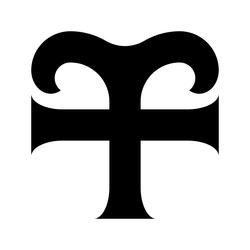
Symbol of Ethos. This symbol means 'sheep', which is why it has sheep horns, showing the Lambs as sheep and the church are the shepherds, or 'Abel'.
Another theme is how religions and religious institutions, when not examined or questioned, can be used as a tool and a weapon by those manipulate others. One example is the Ethos, which engaged in shady manipulation and corruption and preyed on those who come to them for help. In the end, it is destroyed on the inside by two factions: the Solarians that intended Ethos to be used to enrich Solaris with brainwashed slaves and goods from the surface, and the clergy who had become corrupt on the riches that flowed through the organization and preyed on refugees and children for their own desires.
Society[]
| “ | Think about it. What's the purpose of fighting each other on such a tiny planet as this? Fighting out of fear of being hunted into a corner... Rushing in to fight as if there were only so many 'reserved seats' to the rights of life... Starting a war is stupid. Inciting it is also stupid. Killing people as an act of terrorism or as a protest of against wars that kill people is just as stupid. You're all fools! | ” |
Humanity is being ruled by a secret organization that culminates in the floating city of Solaris, which controls the aspects and facets of society and manipulates people through propaganda and psychological warfare, such as instigating prejudice against Demi-humans in Kislev, the Soylent System, Limiters, and other techniques.
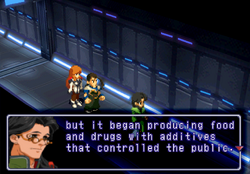
Citan reveals to Fei that Solaris puts additives in the food and medicine to control people.
As the planet's social structures developed, the governmental bodies of countries do in turn, such as the cases of Aveh and Kislev. The two countries remain locked within a conflict that persists for centuries, which is secretly managed by Solaris and similarly interested parties.
Themes of xenophobia and racism are similarly expressed in the hostile relationship between Solaris and Lambs, as well as Demi-humans.
Characters such as Kahran Ramsus, Ricardo Banderas, and Dominia show the conflict that can arise from ideas that some are more inherently valuable than others, whether it be due to societal differences, genetics, or differences they themselves perceive.
Human nature[]
| “ | You humans are truly unusual living beings, aren't chu? You're all like shattered fragments of a mirror.
|
” |
Xenogears contains examples of the dangers of people following ideas blindly without thought or question, the dangers of hive mentality and manipulation can occur. It deals with destructive thought patterns, and how difficult it is to undo them.
Another theme is how children are affected, both positively and negatively, by the actions of their parents, such as Fei, Elly, and Maria Balthasar.
Humans don't get along and are so different from one another, with conflicting beliefs and opinions. Karellen says, "Humans will never come to understand each other. You said that she is the person you love. But can you say that you even truly understand each other? All humans do is place themselves at a comfortable distance from each other and call that 'mutual understanding', 'spiritual unity', or 'true love'... but it is all lies! Man cannot associate with others without first deceiving themselves. That is the way that they were created."
By nature, humans are intrinsically and inherently flawed. However, strength is not inherently good, and weakness is not inherently bad, and together, humanity's capacity exceeds the destiny Deus had laid down in their creation. Marguerite "Margie" Fatima says, "God could have created humans perfectly... But then, humans would not have helped each other." Elly says, "Some things only the weak can feel... But weakness does not make them servile. It's because they are weak, that they can develop kindness... and never look down on people. That is where real human interaction comes from. Everyone has weaknesses. Even you did at first. Your weakness drew you to each other... And made you grow strong. Never forget those feelings. When you all lived together side by side..."
Topics[]
This is a point list of other notable topics touched on in Xenogears. It deals with and examines:
- Anima and animus
- Art and the power of art
- Classism, racism, and ways society can divide itself
- Collective unconscious
- Consciousness (its development and evolution)
- Culture
- Dysfunctional and abusive families
- Free will, the power and physical manifestation of mental will and thought
- Gender
- Genocide
- History, and how culture and beliefs can change over time
- Humans trying to play the role of "God"
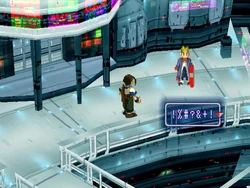
Fei doesn't know what Solarians are saying due to a language barrier, so any Solarian he speaks to results in a "!%#?&+!".
- Language
- Life and existence
- Mental health
- Morality

Kim and Elly.
- Sexuality
- Suicide
- Technology and its role
- Transhumanism - Karellen, who has merged with nanotechnology
- Trauma
